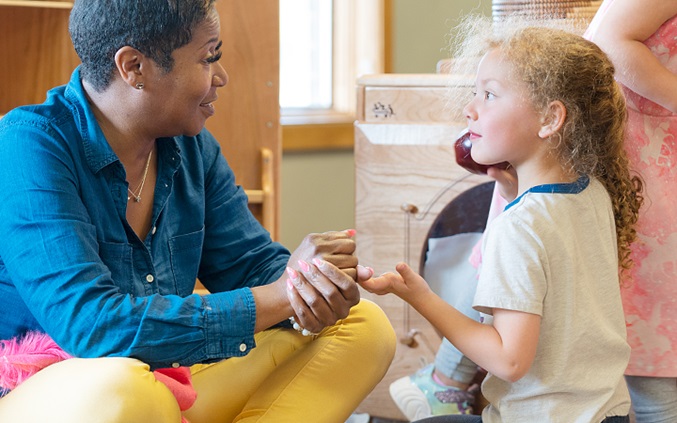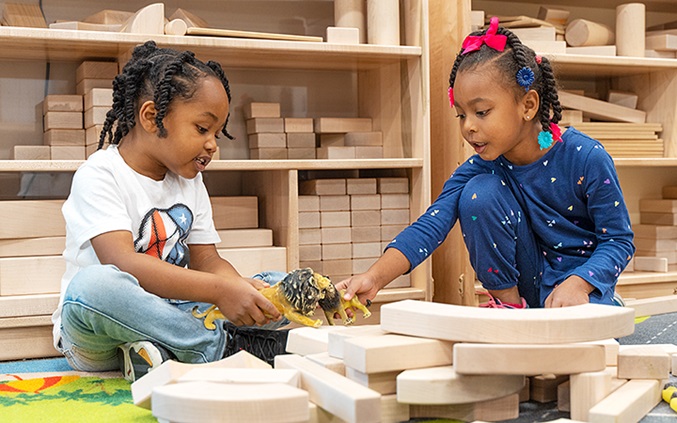Navigating relationships in SEND education
| June 2023Working with children with Special Educational Needs and/or Disabilities (SEND) is extremely rewarding work. There are moments of great joy when children delight us with what they can do or with simply who they are. Sharing these moments with their families is a very special privilege. However, SEND work with families can also be fraught with difficult feelings such as anger, sadness and sometimes blame, and this side of things is perhaps not so often discussed. In light of this, I would like to share some of the theoretical work I’ve drawn on as a nursery school SENDCo to navigate the tougher side of relationships in SEND work.
I have a rather nice, luxurious pot plant on a low table next to my TV at home. It was given to me some years ago by the family of Theo (not his real name), a child with autism and profound and complex needs. That plant is a reminder of not just a lovely boy and an amazing family but also some really difficult moments in my job as a SENDCo.
Theo was about to transfer from nursery to primary school. His family wanted him to attend special educational provision and had seen a school they thought was perfect for him.The local authority, however, disagreed and had allocated him a place in a nearby mainstream primary school. The reasons for this difference of opinion were complex. Local authorities increasingly have to manage very limited resources which may restrict what they can offer a family. However, in this case I think it’s fair to say that in this complicated struggle that had lasted months mistakes had been made on both sides. This battle over Theo’s future culminated in me having to arrange – at the local authority’s insistence – a “transition meeting” with his family, staff from his proposed new school and his current school, mine. I knew that the staff from the new school were anxious and uncomfortable about attending. They were happy to take Theo but knew that his parents were against the move. His family were furious to be in this position and were bringing to the meeting months of built up anger, anxiety and frustration.
I was also filled with anxiety about how to manage this situation. It was my job to lead and bring all the key information about Theo to the meeting. I was afraid to make a mistake that might offend his already unhappy parents, or that they might theoretically use as part of legal proceedings at some future time. I was worried about how the family’s anger and anxiety might make its way into the proceedings―would I come under fire? Would my colleagues? I nervously prepared a meeting room, and as we gathered the atmosphere was heavy with apprehension and barely concealed fury. I was at the point of launching into the standard agenda, but then at the last minute I took a leap of faith. I put aside item one and started by trying to acknowledge what a difficult situation we were all in. I talked about the pain and difficulty I had witnessed for the family in their attempts to get what they felt their very vulnerable child needed. I talked about how the receiving school understood the family’s situation. I talked about how everyone wanted Theo to thrive.
When I finally got back to the official agenda, a great weight of tension had left the room. I can’t pretend it was an easy meeting, but Theo’s parents were able to express their feelings and the conversations remained respectful and constructive. Suffice to say that Theo never went to the mainstream school, but we had all managed to remain open to collaboration and maintain a level of trust and mutual respect.
Why do so many powerful and difficult emotions surface in this work? At the heart of it are children who are not developing in a typical way and certainly not in the way that their families expected. As children they are intrinsically loveable and often genuinely admirable, but they may also pose huge challenges for their families. Many of the children I work with have profound communication difficulties so their loved ones struggle to understand them, causing their children become frustrated or frightened, which in turn can lead to an array of difficult behaviours. These are the children who don’t sleep well, don’t eat well, find it harder to learn to use the toilet and have frequent tantrums that can leave them and their carers exhausted and distressed. Simple things like going shopping, family parties or travelling by bus can become huge struggles. Some children I work with have complex health needs that as well as posing practical problems can lead to intense anxiety for their families. All parents of children with special educational needs worry about them now and for their future. When you work with young children you are also supporting parents at a time when they may only just be coming to terms with the idea that their child has lifelong special needs. They are at the start of a profound, life changing journey. They may be experiencing a sense of loss or even mourning for the child they expected to have while accepting the (wonderful, but different) child they actually have.
Surrounding the complexity of these individual situations is a society that allocates limited resources to support these children and their families, plus a whole range of stigma and misunderstanding. It is no wonder that a myriad of painful and confusing emotions emerge. Many parents feel they alone must fight for their children’s rights and may take any professional they meet to be the ill-defined 'enemy’.
So how do we navigate these difficulties and make sure children and families get what they need and deserve?
The insight I stumbled on in the family meeting for Theo was how useful it can be to acknowledge and voice challenging emotions, which might mean stepping aside for a moment from the formal agendas typical of SEND work. This approach has its roots, among other places, in the active listening tradition in counselling and therapy popularised by Carl Rogers. The key is to face these uncomfortable emotions, to expect and accept them and not rush to try and sweep them aside or to try and resolve all the issues. Most important of all is to keep the bigger picture in mind and try not to take parents’ concerns as a personal attack. Of course, families are also looking for practical solutions. As an educator, not a counsellor, I have to think about solutions too, but just taking a moment for all parties to acknowledge what is happening emotionally is often a crucial part of the process in finding a way forward. Being honest in this way also helps build trust which supports the working relationship between professionals and families.
However, given the multiple pressures, there are times when simply acknowledging feelings won’t be enough to prevent a breakdown in constructive relationships between parents and professionals.
I can bring to mind many examples over the years when a family’s difficulties have led to them directing anger or distress towards me or my colleagues. Sometimes, of course, this is justified if a mistake has been made, but sometimes the feelings coming your way can feel unjustified, out of proportion with events and perhaps deeply critical and personal. At other times anger, mistrust or anxiety are expressed as avoidance, when families are reluctant to liaise with educators about their child. When this happens, taking time to consider what needs to be resolved is crucial. Ultimately, it often falls to you as the professional to find a way back to a constructive working relationship.
When navigating such challenges, I find it helpful to remember that positive, constructive interactions are not necessarily smooth or without difficulties. Relationships which are damaged or even at break-down point can be mended, and may even be stronger as a result. This idea of the strength in ‘rupture and repair’ is part of attachment theory originating with John Bowlby in the 1950s on how effective parents relate to their children. A parent who is tuned in to their child’s needs will seek to repair missteps and misunderstandings, and this may deepen the collaboration in ways that would be missed without this ‘rupture’. This pattern is also a key part of adult relationships, including professional liaisons.
Sometime a repair might be as simple as an acknowledgement of the other party’s unhappiness, apologising for a mistake or expressing a desire to move forward. This is something I’ve had to do countless times following poor communication or in response to feelings of anger and frustration. Sometimes it requires real persistence and resilience on the part of the professional who is seeking to make the repair.
There are also times when families show us how this should be done. I was reminded of this recently when a colleague made a mistake. When a parent arrived at nursery to collect at the end of the day they found their child with SEND in the middle of a serious tantrum. The teacher on duty was in a rush to get to a meeting and simply handed the little girl over, offering no help and little explanation. The parent was then left to deal with an increasingly distressed child all the way home, and understandably was left feeling very upset about the way she and her child had been treated.
The following day she made an angry complaint, and a colleague and I arranged to meet with her. We have learned enough that rather than trying to lead the meeting we began by offering her the floor. She surprised us by opening with an African proverb about a dog rejecting his faithful master. This was perhaps unusual, but it proved an eloquent way to communicate her pain in getting to the nursery to find her child apparently unhappy to see her. She then told us the story of a journey home with an extremely distraught child, dealing with complaints from angry bus users faced with a child in melt-down in the middle of rush hour. She finished by saying how much she admired the nursery staff and told us she understood what a hard job we had. At this point we had simply listened to her. We then had no difficulty in offering a sincere apology, and were all able to discuss ways to avoid such unsettling transitions. She had led us in making a repair when our previously positive relationship had taken a serious knock.
Dwelling on the more challenging side of relationships with families in SEND work may seem unduly negative. However, I find that accepting the inevitability of difficult feelings and seeing them as an integral part of the work has helped me navigate choppy waters and to continually try to offer what children and families deserve.











